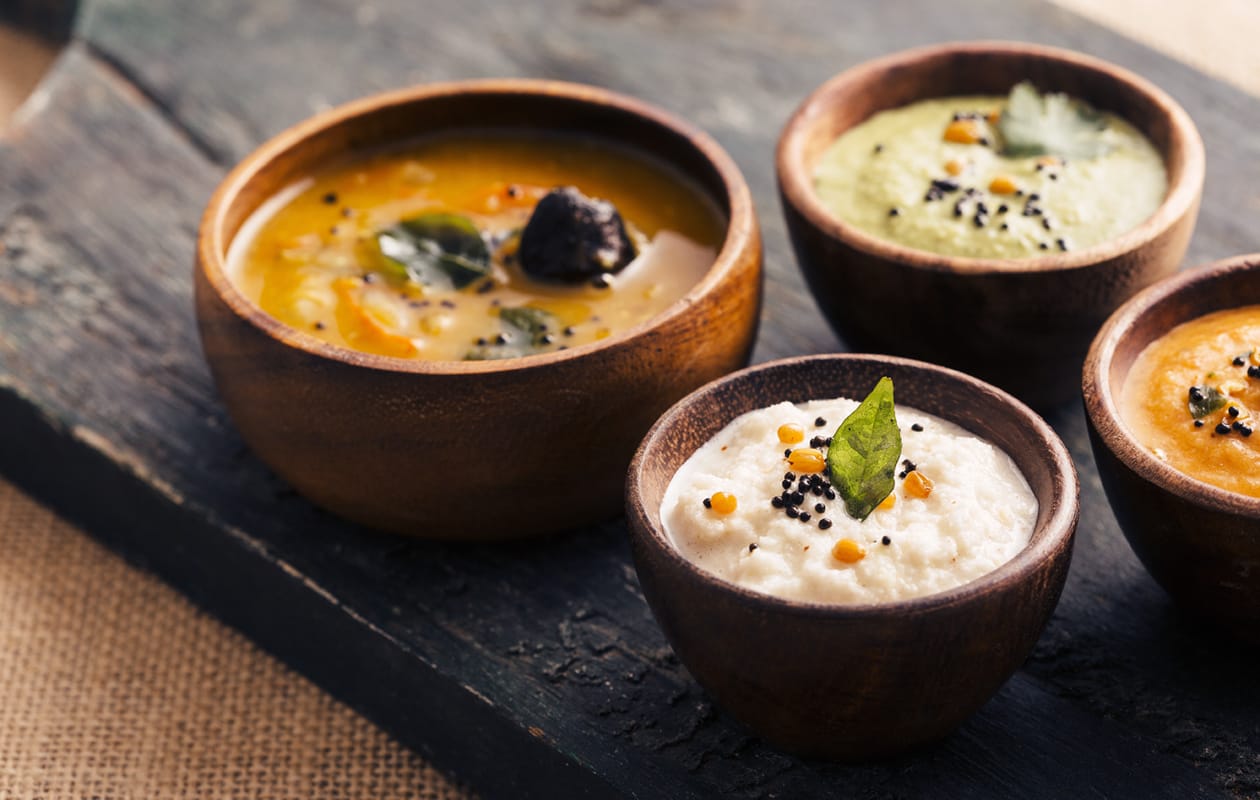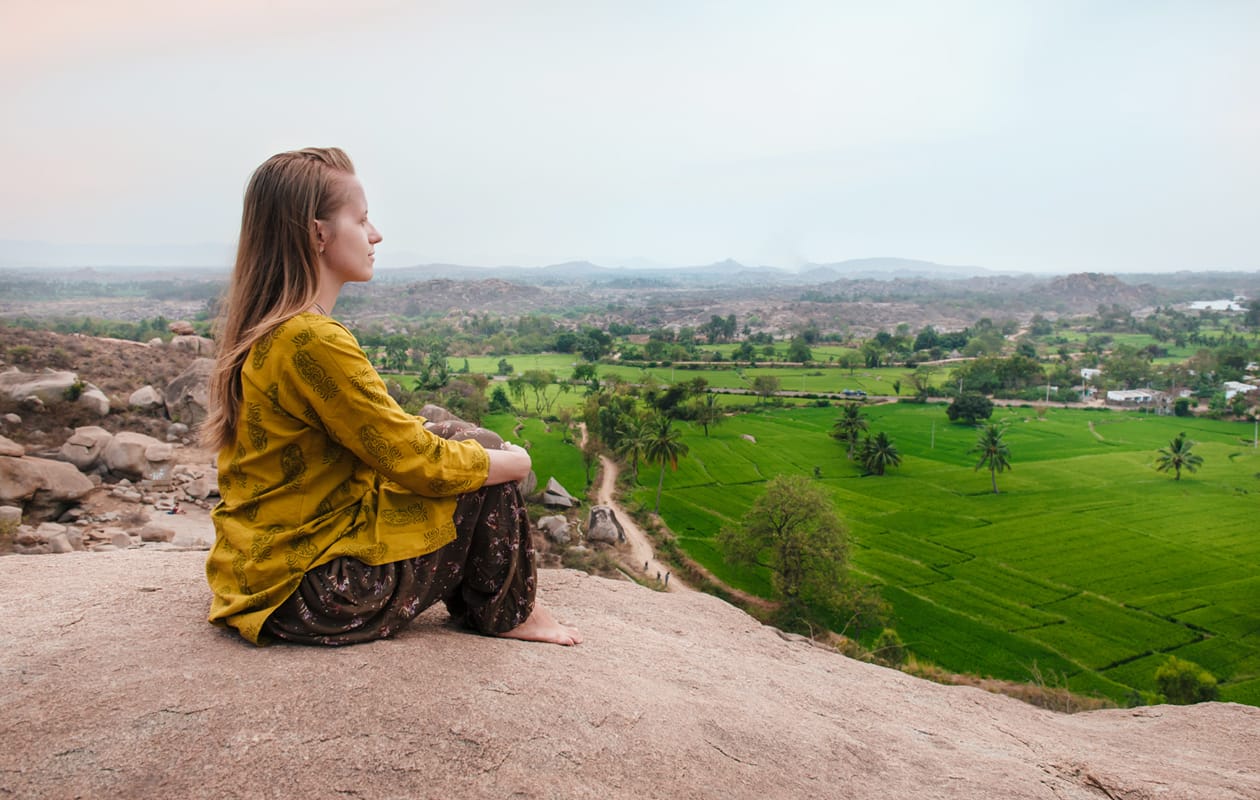You’re at dinner with a friend who does just fine with kidney beans and salad and you can only seem to digest light soups. Meanwhile, your other friend enjoys a flaming hot chili which no one else at the table can touch. One person’s food is another person’s poison and indeed, everybody is unique!
According to Ayurveda, the 5,000 year old ‘science of life’, your structure, function, tendencies and affinities are governed by what is called your Prakriti, or constitution. Learning more about this empowers you to make optimal lifestyle choices that prevent disease and support overall wellbeing. This is crucial in today’s day and age when 6 in 10 people in the US suffer from lifestyle based chronic illnesses like diabetes, cardiovascular disorders and certain forms of cancer.1 Their incidence and the debilitating toll they take on our lives, and livelihood, can be reduced through preventative medicine.
Prakriti: your Ayurvedic Constitution
Prakriti is your constitution or natural state at the time of conception, which is a combination of three energy principals called Doshas. Prakriti is unchanging through life. Prakriti inherently cannot be the cause of disease, though it could generate a propensity for certain disorders. Assessment of Prakriti is the first step in traditional Ayurvedic treatment as practiced in the Indian subcontinent, as it establishes what is a person’s unique “normal.”
Prakriti is often known simply as “Dosha” and you might come across the question – “What’s your Dosha” To be accurate: everyone has all three Doshas present. Your constitution could predominantly consist of one Dosha, two Doshas, or rarely, a balance of all three. Prakriti is also perceived as an Ayurvedic body type, though it also includes mental and emotional qualities.
Let’s explore each individual Dosha. What resonates with you and sounds like you?
Vata Dosha

Vata Dosha is formed from the air and ether elements and is the energy principle of movement. It is cold, dry, light, mobile, irregular and rough. If Vata predominates you are likely to be either very petite or very tall (think: extremes), with dry skin and sensitivity to cold and dry weather. Your sleep may be light and restless. You could be active, enthusiastic, open-minded and creative, but your energy levels may be variable. You are prone to nervous and joint disorders, allergies, constipation, anxiety and restlessness.
Pitta Dosha

Pitta Dosha is a combination of fire and water and is the energy of metabolism. It is a hot, oily, light, liquid, sharp, soft and smooth principal. If Pitta dominates you are likely to be medium built with warm, ruddy skin and a tendency to get sunburnt. You have a robust appetite, could get irritable if you skip meals. You have light but good sleep. You are bright and intellectual but could be excessively competitive and argumentative. You are prone to inflammation, heartburn and aggression.
Kapha Dosha

Kapha Dosha is a combination of water and earth and is the energy of cohesion. It is cool, wet, oily, heavy, dense, static and stable. If Kapha dominates you could have a larger frame, tendency to gain weight, steady appetite, a loving, easy-going nature with a resistance to change. You could be prone to congestion, edema, sluggish digestion, weight gain, depression and lethargy.
Dosha combinations
Your Prakriti could be:
Vata – Vata Dosha is predominant
Pitta – Pitta Dosha is predominant
Kapha – Kapha Dosha is predominant
Vata-Pitta – Vata and Pitta Doshas are both predominant over Kapha
Vata-Kapha – Vata and Kapha Doshas are both predominent over Pitta
Pitta-Kapha – Pitta and Kapha Doshas are both predominant over Vata
Vata-Pitta-Kapha – this is a rare Prakriti in which all three Doshas are fairly equal; no Dosha is predomindant over any other
Determining your Prakriti
There are many online quizzes to determine Prakriti, but they have their anomalies and shortcomings. It is difficult to incorporate the skill of a trained Ayurvedic professional’s assessment into a digital format, so it is best done in an Ayurvedic consultation.
Knowledge of your Prakriti helps you with a plan that has aided many achieve a breakthrough in their overall health.2 It’s also part of the healing transformation in our basic and level I certifications, the Holistic Ayurvedic Coach and Ayurvedic Health Counselor programs. Here are some examples of how you could benefit from knowledge of your Prakriti, just like our students and wellness seekers!
Ten ways knowledge of Prakriti can transform your health
1. Preventative health practices for total mind-body-spirit balance
Chronic diseases are the leading causes of death and disability in America, and a leading driver of healthcare costs, which makes preventative health so important.3
Consider Vata qualities like dryness and cold that eventually impact joint health. As a Vata person, you can be mindful of this right from childhood and balance them with opposite principles through hydrating, oleating with oil in your diet, regular self-massages, staying warm and eating warm foods.

2. Dietary habits to maximize nutrition, digestion and absorption
All food is classified in Ayurveda based on elemental compositions into Shadrasa, or six tastes, that are suitable in different amounts for the various types of Prakriti. All tastes are necessary for a balanced diet, though you will benefit from favoring or minimizing certain tastes at different times of the year and for your Prakriti. The tastes include sweet, salty, sour, bitter, astringent and pungent.
For example, as a Kapha person, you can follow a “Kapha diet” by favoring bitter, pungent and astringent tastes, and eat warm and light foods. Such simple adjustments can prevent heaviness, lethargy and congestion, especially during winter and spring – the Kapha seasons. A Pitta diet would favor sweet, bitter and astringent tastes, and a Vata diet may emphasize sweet, salty and sour.
3. General lifestyle adjustments for feeling your best!
Your overall lifestyle is altered with a knowledge of Doshas.
As someone who is Vata-Pitta, you know that you have a tendency to overdo things and burn out. To accommodate, you make time to go over your priorities each morning and eliminate anything which isn’t necessary. You also build in breaks for meals, walks and meditation, setting an alarm so you don’t forget. This helps you slow down consciously.
4. Sleep patterns for better rest and improved energy
Sleep is one of the three pillars of health in Ayurveda and can make all the difference to your health. Sleep recommendations are personalized, too!
If you’re a Kapha person, you don’t need as much sleep as any other Prakriti, and should avoid daytime sleep, especially during spring. This simple alteration can help with depression and respiratory ailments.
5. Exercise and yoga guidelines
Exercise and yoga can be tailored to your unique Prakriti to ensure you get the most benefit, and no negative side effects from your activity.
As a Vata, you could have degenerative tendencies and need strengthening exercises and grounding yoga. Pitta are stronger but can be overly competitive and should avoid burnout. Kapha are known for taking things too easily, but have good strength and need more exercise! Reference this article on how yoga can be adapted to different Doshas.
6. Select a job and hobbies to meet your needs
Your career and hobbies can align with your talents and tendencies through the knowledge of Doshas.
Imagine a start-up company: Vata would have the brilliant idea, Pitta, the drive to set up the company and lead it and Kapha, the ability to sustain it!
As a Kapha person, you would do well in customer service since Kapha tends to be patient and nurturing. As a Pitta, you could get triggered in an unorganized environment, and as a Vata person, you are likely to lose focus easily in long, ponderous meetings! Vata-Pitta could burn out easily, Pitta-Kapha are organized yet patient and Vata-Kapha have the creative ideas and wherewithal to sustain them! Knowing yourself helps you pick a career, optimize strengths and adapt your interactions with colleagues.

7. Harmonious relationships and the ability to help family and community
What is the Prakriti of your family members and friends? As you delve deeper into Ayurveda, besides knowing yourself, you may be able to help your community make lifestyle adjustments. You would also be able to empathize with people better and have harmonious relationships!
Have you encountered someone who gets angry and argumentative easily? This person could very well be Pitta dominant. Then there are those who are quiet and don’t express an opinion or preference easily. Most likely they are Kapha! You know not to be combative with a Pitta person, to enjoy the whimsical side of Vata and the stability a Kapha brings in a relationship!
8. Adaptivity to your surroundings
You are a part of nature and adapting to it can help you with your health.
A Vata, Pitta and Vata-Pitta aggravation is likely to get worse in dry, arid lands (Jangala Desha) but they can learn to balance this with awareness. Vata, Kapha and Vata-Kapha disorders are more common in marshy lands (Anupa desha). A more temperate climate (Sadharana Desha) is Dosha balancing. You can customize your diet and nutrition to balance the qualities of your surroundings.
9. Adapting to daily, seasonal, natural rhythms and stages of the life cycle
Being mindful about natural rhythms can help you adapt your lifestyle.
Afternoon is Pitta time and the best time to have your heaviest meal. Pitta is also more likely to be aggravated in young adults and in the summer. Knowing your constitution allows you to make adjustments to minimize these kinds of imbalances.

10. Mental health and stress management
Stress can lower immunity and render you susceptible to many diseases, Ayurveda is a holistic science that acknowledges the mind-body connection. Understanding your tendencies helps you manage stress.
Are you a Pitta person who tends to fly off the handle? A Vata with a tendency to anxiety who needs to follow a routine, oleate and stay grounded?
Mental health management also involves an understanding of the Mental Doshas, or Gunas – Sattva, Rajas and Tamas. You can read more about the Gunas and self-care here.
Prakriti and natural healing
Prakriti teaches you about your entire mind-body system, and how you interact with people and your environment. While your Prakriti is unchanging, Vikritis or imbalances creep up and generate diseases based on your lifestyle, diet, stressors, environment, natural and external factors and genetic propensity. An Ayurvedic professional will work to assess both and generate a healthcare protocol to restore health naturally and holistically.
The pandemic has also taught us the importance of preventative health, ensuring our immunity is strong and comorbidities are in check. The health of the community begins with the health of an individual and knowledge of your Prakriti is a powerful ally in healing yourself… and the world.
Notes
- Chronic Disease Center (NCCDPHP) | CDC
- Research on Prakriti: In Preventing Lifestyle Diseases
- About Chronic Diseases | CDC





